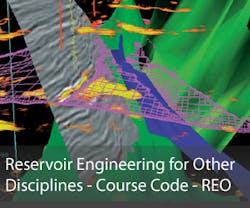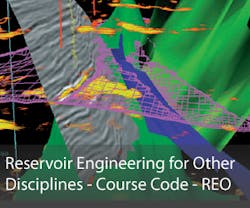Reservoir Engineering for Other Disciplines - REO
This course gives the non-reservoir engineer a better understanding of reservoir engineering practices and limitations. The course is designed to provide a good understanding of reservoir engineering processes, the required data, and the limitations on the engineers' analysis and interpretations. The course also provides persons who are already well trained in the other upstream petroleum industry technical disciplines with an understanding of the current state-of-the-art practice of reservoir engineering. One personal computer is provided, at additional cost, for each two participants.
This course is designed for engineers and geoscientists now working in an asset environment where they need to better understand the practices and limitations of the methods and procedures employed by the reservoir engineers with whom they work. Participants should have three or more years of technical experience in the upstream petroleum industry
You will Learn:
- Utilize the tools and techniques of the reservoir engineer
- Apply the principles of reservoir engineering
- Develop reservoir, well performance and asset management options
Course Content:
- Distribution of reservoir properties: Structure, fluid contacts, water saturation, and pressure
- Rock properties: Porosity, permeability, capillary pressure, and relative permeability
- Fluid properties: Phase behavior of reservoir fluids, properties of gas, oil and water, PVT sampling and PVT laboratory reports
- Volumetric calculation of initial hydrocarbons in place: Oil in place, gas in place, addressing uncertainty using probabilistic methods, reserve booking practices, and reservoir recovery efficiencies
- Material balance methods: Oil reservoir material balance, Havlena Odeh method, gas material balance, volumetric, compaction, water drive and compartmentalized reservoirs
- Fluid flow and well performance: Radial and linear flow, transient, pseudosteady state, steady state flow regimes, productivity of vertical and horizontal wells
- Aquifer influx
- Immiscible displacement: Fluid displacement process, fractional flow, Buckley Leverett, Welge, water under running and gas overriding
- Coning and cusping: Description of process, critical rates, using horizontal wells
- Reservoir types and drive mechanisms: Gas reservoirs: volumetric, water drive and compaction drive - Oil Reservoirs: solution gas drive, water drive, water flood, gas cap expansion, combination drive, naturally fractured and critical reservoir fluid reservoirs
- Reservoir simulation: Why simulate, types of simulators and simulation models, setting up a simulation model, conducting a simulation study
- Field development planning: Characteristics, planning tools, deliverability issues, determining a well count and rate forecast


